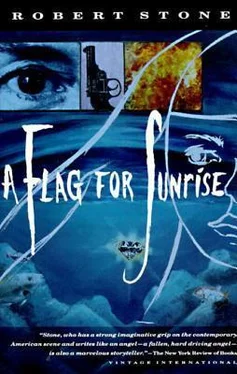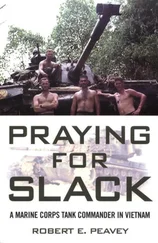Robert Stone - A Flag for Sunrise
Здесь есть возможность читать онлайн «Robert Stone - A Flag for Sunrise» весь текст электронной книги совершенно бесплатно (целиком полную версию без сокращений). В некоторых случаях можно слушать аудио, скачать через торрент в формате fb2 и присутствует краткое содержание. Год выпуска: 2012, Издательство: Vintage, Жанр: Современная проза, на английском языке. Описание произведения, (предисловие) а так же отзывы посетителей доступны на портале библиотеки ЛибКат.
- Название:A Flag for Sunrise
- Автор:
- Издательство:Vintage
- Жанр:
- Год:2012
- ISBN:нет данных
- Рейтинг книги:4 / 5. Голосов: 1
-
Избранное:Добавить в избранное
- Отзывы:
-
Ваша оценка:
- 80
- 1
- 2
- 3
- 4
- 5
A Flag for Sunrise: краткое содержание, описание и аннотация
Предлагаем к чтению аннотацию, описание, краткое содержание или предисловие (зависит от того, что написал сам автор книги «A Flag for Sunrise»). Если вы не нашли необходимую информацию о книге — напишите в комментариях, мы постараемся отыскать её.
A Flag for Sunrise — читать онлайн бесплатно полную книгу (весь текст) целиком
Ниже представлен текст книги, разбитый по страницам. Система сохранения места последней прочитанной страницы, позволяет с удобством читать онлайн бесплатно книгу «A Flag for Sunrise», без необходимости каждый раз заново искать на чём Вы остановились. Поставьте закладку, и сможете в любой момент перейти на страницу, на которой закончили чтение.
Интервал:
Закладка:
The border between Compostela and Tecan proved to be an affair of some social complexity. The Compostelan dimension consisted of three adjoining green buildings atop one of which the national banner hung lifeless from a peeling flagpole. The highway was blocked by a series of speed-trap bumps, the bumps were green-striped on the Compostelan side; on the Tecan side the stripes were yellow. Four Compostelan border policemen in green tropicals and Wehrmachtstyle caps lounged together in the shade of the customs shed, a fifth was making what appeared to be a halfhearted inspection of a truck loaded with kerosene stoves. From the perfunctory nature of his poking and prodding about the truck, he appeared not to have had his turn at AID customs school.
The real action was all on the Tecanecan side. There, six or so trucks were lined up at the side of the road while Tecanecan customs men in coveralls went over them with screw drivers and flashlights. The difference in ambiance on the far side of the border was reinforced by the presence there of the Tecanecan Guardia Nacional, whose uniforms, resembling those of American paratroopers complete with the laced boots and colored scarves, were freshly pressed and spotless and quite different from those of the ordinary customs inspectors. The Guardia were occupying themselves with a long line of young foreigners who had been lined up in the middle of the road beside their shoulder bags and bagpacks and who stood, facing Compostela, squinting into the sun and looking frightened and unhappy.
Zecca had parked his car so that its front tires surmounted the first Tecanecan speed bump; those foremost in the line of colorful young travelers could exchange glances with the passengers in the Honda at a distance of a few feet.
“It’s hard to get into Tecan if they think you look funny,” Zecca said. “It’s even harder to get out.”
There was a sergeant in charge of the line of funny-looking foreigners. The sergeant was black, although it was not a part of Tecan where many black people lived — the Guardia Nacional pursued the tradition of stationing the members of the gendarmerie as far as possible from their native region. This made assignments fairly predictable in Tecan; it was not a large country and its only regions were the mountains and the land on either side of them.
The sergeant was repeatedly inspecting and commenting upon the hippie gringos. From time to time, he would seize hold of a boy’s long hair and pull him out of line, caress the hair while making kissing noises with his mouth, shout something at the youth and shove him back in line. He had a repertory of spits and sneers and snarls and his smiles were not good-humored. When he came to a girl who struck his fancy, he would pause contemplatively and feel her up. No one seemed to be protesting his behavior.
“Shit,” Zecca said, “they must have caught someone with grass.”
“I think someone should have a word with that guy,” Marie said.
On the opposite side of the road, another event was in progress. A cow had fallen into the ditch that marked the frontier and entangled itself in the wire the Tecanecans strung on their side of the line. A crowd of local boys, w hose proper business was assisting tourists through customs, selling cold drinks or begging, were amusing themselves by stoning it to death. The cow had so totally engaged their attention that they ignored the Zeccas’ car.
The animal had lost its footing and was lying with its back legs tucked under it, its hooves tearing ineffectually at the dirt and wire while the rocks crashed down on it from every side. The boys would exhaust their handful and then run off into the sandy fields to gather more. Each stone was received by the cow with a soft bellow. Its eyes and nostrils were beginning to show blood.
“Look at that, for Christ’s sake,” Marie said. “Are we going to do something about this bullshit?” she asked her husband.
“Hang on,” he told her. “Everybody give me their passport.” The Honda’s passengers gave him their passports; he climbed out from behind the wheel and held a brief dialogue with the officials on the Compostelan side.
Holliwell and Bob Cole sat watching the boys stone the cow. As they watched, one of the smaller boys looked over at the car, wiped his hands and approached them with a glass jar. He thrust the jar through the open window into Holliwell’s face — inside was the largest scorpion Holliwell had ever seen.
“Two dollar,” the boy said.
“No,” Holliwell said. “No, gracias. ” For a moment he thought he might be being threatened. If he failed to produce two dollars the boy would drop it on his chest.
“One dollar,” the boy said.
Marie Zecca let out a fetching little scream.
“No,” Holliwell said. “ Otra vez. ”
But the boy only made a farting noise at them and ran back to throw more rocks at the cow.
“That thing must have been nine inches long,” Marie Zecca said.
“Smaller than that, surely,” Bob Cole told her.
Tom Zecca came back clutching the brace of passports.
“What happened?”
“A kid just tried to sell me a scorpion,” Holliwell said.
“Hell, you can’t give them away around here. This is alacrán city.”
“I suppose,” Bob Cole said, “it’s considered a souvenir.”
Marie Zecca grasped the back seat and turned to Tom.
“Look, man — those nasty little kids are murdering a defenseless animal and over there that goddamn Guardia is abusing women and children. Can we do something about this action?”
“Sure,” Zecca said. He handed the passports back round and started up the car, easing it over the Tecanecan speed trap. This forcing of his nation’s border attracted the Guardia sergeant’s attention; he came toward them with languid belligerence, walking with his hands on his hips.
“ Buenos tardes, sargente ,” Tom Zecca hastened to say, when the Guardia stood beside his window. He thrust the red passport into the sergeant’s hand. The Guardia looked at it through the reflecting sunglasses that were as much a part of the Guardia uniform as the paratroop boots. Within a moment of inspecting the passport, the sergeant drew himself to attention and saluted energetically.
“ Señor Capitano, bienvenidos a su casa. ”
Zecca thanked him for his kind greeting and returned his snappy salute.
“What about the cow?” Marie whispered.
From where they were now parked, Holliwell was looking out nearly eye level with the young Europeans and North Americans who were trying to cross the border. A number of them, boys and girls both, had begun to cry.
“Sergeant,” Tom Zecca said, “I’m sure you know how women are. My wife here is disturbed by the misfortune of that cow. Can something be done?” His Spanish was effortless, unashamedly American in accent.
“ Capitano ,” said the Guardia, smiling with Zecca, “ claro que sí. ”
He walked over toward the ditch, drawing the automatic pistol from the web belt at his waist as he went. Bracing his legs, he fired the weapon three times, a few inches above the hairline of the tallest boy. The gringo youths in line recoiled at the firing. The boys dropped their stones and scattered crouching, diving for cover. Some cringed along the shoulder of the highway, sad-eyed waifs awaiting the sensitive photographer, their hands clasped over their heads.
The cow was so startled at the burst of fire that it freed itself from the wire in an awkward lunge, gained its feet and succeeded in hauling itself out of the ditch. Liberated, it trotted up to the Pan-American Highway, eluded a charge by the cursing Compostelan customs cops with a bovine end run and took off down the center line, headed for the capital.
Читать дальшеИнтервал:
Закладка:
Похожие книги на «A Flag for Sunrise»
Представляем Вашему вниманию похожие книги на «A Flag for Sunrise» списком для выбора. Мы отобрали схожую по названию и смыслу литературу в надежде предоставить читателям больше вариантов отыскать новые, интересные, ещё непрочитанные произведения.
Обсуждение, отзывы о книге «A Flag for Sunrise» и просто собственные мнения читателей. Оставьте ваши комментарии, напишите, что Вы думаете о произведении, его смысле или главных героях. Укажите что конкретно понравилось, а что нет, и почему Вы так считаете.












